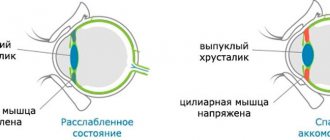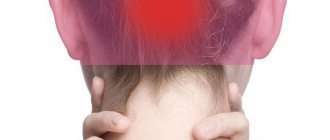Sign up
Price
Our doctors
Headaches during pregnancy occur quite often, and, as a rule, they are not dangerous to health.
Noise, stress, fatigue, too little outdoor exercise, lack of sleep, as well as too much sleep (especially in the second half of pregnancy), insufficient fluid intake and poor nutrition are the main culprits of headaches during pregnancy. Pain that occurs in early pregnancy can be associated with hormonal changes. An increase in the synthesis of estrogen and progesterone, necessary for the development of a child, causes water retention in the tissues. Swelling occurs, including in the brain tissue, where nerve receptors respond with pain to increased pressure. Fortunately, this is not dangerous for the mother and fetus.
TREATMENT OF HEADACHES DURING PREGNANCY AND BREASTFEEDING IS AVAILABLE AT: BRANCHES
Treatment of headaches during pregnancy and breastfeeding in the Primorsky region
Address: St. Petersburg , Primorsky district, st. Repisheva, 13
Treatment of headaches during pregnancy and breastfeeding in the Petrograd region
Address: St. Petersburg , Petrogradsky district, st. Lenina, 5
Treatment of headaches during pregnancy and breastfeeding in Vsevolozhsk
Address: Vsevolozhsk , Oktyabrsky Prospekt, 96 A
When is it necessary to consult a doctor?
It is necessary to consult a specialist and undergo diagnostic examinations if:
- sudden onset of severe headaches, their intensification and frequency;
- the appearance or intensification of pain during physical activity;
- the occurrence of additional symptoms - nausea, vomiting, difficulty swallowing, high temperature, increased blood pressure, pulsating tinnitus, increased urination, swelling, numbness of the limbs or face, visual or speech disturbances, lethargy, confusion.
Prevention of headaches during pregnancy
First of all, you need to relax. In fact, there are more important things than the mood of the boss, the color of the wallpaper in the room or the order in the closet. Every day you should provide yourself with 8-10 hours of sleep. It is necessary to remember about walks and regular meals, because hunger is manifested not only by sensations in the stomach, but also by headaches. Your diet should contain sources of magnesium (buckwheat, flour, pumpkin seeds, cocoa, bananas), since a deficiency of this element often causes tension headaches. Such dull and not very severe pain can persist for a week.
Even slight dehydration can cause similar problems, so don't forget to drink. It is worth remembering that not all drinks are equally good during pregnancy. Coffee, tea, or thick juices may cause the body to lose fluid or interfere with its absorption. The best option is pure non-carbonated water with a low content of minerals (up to 500 mg of elements per liter), which will not put too much strain on the kidneys, which bear a double load during pregnancy.
It is necessary to remember about a comfortable bed, because the spine can also be the cause of headaches. The mattress should not be too hard, since on a hard base your bones and muscles are constantly under tension and do not rest, and not too soft, since in this case the load on the spine will be uneven.
Diagnostics
Complaints of pain in the head are considered by doctors as a subjective sensation of the patient. To find the cause of this condition and prescribe appropriate therapy, you need to conduct a diagnosis. If you have a headache during pregnancy, women are prescribed:
- blood pressure control -
allows you to notice a tendency to increase or decrease it; - a general blood test
will show the presence of an inflammatory or infectious process; - general urine test -
will indicate the presence of pathology of the excretory system; - EEG -
a study of the electrical activity of the brain will reveal damage to the nervous system; - Ultrasound of cerebral vessels -
detects vascular pathologies; - MRI of the cervical vertebrae (except for the 1st trimester)
will show osteochondrosis.
After a full examination, the doctor selects an individual treatment regimen in accordance with the stage of pregnancy and the presence of chronic diseases. Self-prescription of medications is unacceptable and can lead to complications.
Headache while breastfeeding
The occurrence of headaches during lactation and breastfeeding is often associated with chronic lack of sleep and fatigue of young mothers. These may include tension headaches and migraine pain. By organizing your day and taking frequent rest, such pains go away on their own.
However, for more serious reasons (hypertension, head injuries, infectious diseases), it is necessary to consult a doctor who can examine you for other diseases, such as intercostal neuralgia or sciatica.
Prevention
Help prevent headaches:
- walks in the open air;
- swimming;
- frequent change of activities throughout the day;
- breaks when working on the computer every half hour;
- maintaining a daily routine that includes proper rest;
- balanced diet;
- consumption of a sufficient volume of fluid (1.5-2 liters per day);
- avoiding stress, overwork, noisy, smoky and poorly ventilated rooms;
- quitting smoking and alcoholic beverages;
- exclusion from the diet of chocolate, grapes, hard cheeses, Chinese dishes, and flavor enhancers.
It is impossible to find out the cause of the pain on your own. Therefore, if you experience any discomfort in the abdominal area, you should consult a gynecologist to avoid dangerous complications.
Take care of your health and contact a qualified physician if you experience any symptoms.
Treatment of headaches during pregnancy and breastfeeding
The intake and dosage of pain medications should be discussed with your gynecologist. Due to the fact that many painkillers (including analgin and aspirin) have a harmful effect on the unborn child (teratogenic effect), restrictions on the use of medications are introduced during pregnancy. These restrictions remain in case of headaches and during breastfeeding for the reason described above, since all medications pass into milk.
Some of the mild recommended painkillers are paracetamol-based medications.
However, we also emphasize that before treating a headache, it is necessary to identify its cause, so that the headache does not turn out to be a symptom of a tumor in the brain.
In our multidisciplinary clinic you can undergo examination and consult with competent doctors.
Migraine
With migraine, the headache is usually pulsating in nature and unilateral, predominantly frontotemporal, with irradiation of pain to the eyes on the side of the pain, although there are cases of bilateral localization.
The intensity of the headache is very pronounced. Such a headache takes a woman away from her daily activities, forces her to lie down with her head in the pillow and not move, since any movement intensifies the headache. Another characteristic symptom of migraine is increased sensitivity to sound and light, combined with sweating, palpitations and nausea, and sometimes vomiting. Sometimes a migraine attack can be preceded by dizziness, the sensation of strange smells and even visual disturbances (zigzags, sparkling dots, sparks from the eyes). However, approximately seven out of ten women note that headaches during pregnancy either regress completely or bother them significantly less, and are easier in the second and third trimester, which is associated with changes in the level of estrogen in the hormonal system of a pregnant woman. However, one in ten women report worsening headache symptoms during pregnancy. After childbirth, in most women, migraines return to their previous course. In addition, migraines have certain provocateurs: imbalance of estrogen levels, bright light, sound, lack of sleep, oversleeping, stress, hunger, red wine, etc.
Cost of treatment for headaches during pregnancy and breastfeeding:
| Services list | Price in rubles | |
| Saint Petersburg | Vsevolozhsk | |
| Initial appointment with a 1st level neurologist | 1850 | 1700 |
| Repeated appointment with a 1st level neurologist | 1650 | 1500 |
| Initial appointment with a 2nd stage neurologist | 2100 | — |
| Repeated appointment with a 2nd stage neurologist | 1900 | — |
| Initial appointment with neurologist Kolyada A.A. | 3200 | — |
| Repeated appointment with neurologist Kolyada A.A. | 2900 | — |
| Initial appointment with a neurologist Eroshina E.S./Irishina Yu.A./Tsinzerling N.V. | 4000 | 4000 |
| Repeated appointment with a neurologist Eroshina E.S./Irishina Yu.A./Tsinzerling N.V. | 3500 | 3500 |
| Initial appointment with neurosurgeon A.I. Kholyavin | 3300 | — |
| Repeated appointment with neurosurgeon A.I. Kholyavin | 2900 | — |
| Neurologist's report for reference | 700 | 700 |
| MANIPULATION | ||
| Piriformis muscle block | 2000 | 2000 |
| Occipital nerve block | 1800 | 1800 |
| Carpal tunnel block | 2500 | 2500 |
| Block of the sacroiliac joints | 2700 | 2700 |
| Suprascapular nerve block | 1800 | 1800 |
| Botulinum therapy | 5300 | 5300 |
| Botulinum therapy for bruxism and chronic facial pain | 18000 | — |
| Infusion relief of acute back pain syndrome | 1750 | 1750 |
| Plasmolifting (1 procedure) | 3100 | 2800 |
| Transcranial polarization in Parkinson's disease (30 min) | 1800 | — |
| Pharmacopuncture | from 1500 | from 1500 |
| HEADACHE TREATMENT | ||
| Botulinum therapy for chronic migraine | 35000 25900 | 35000 25900 |
| Targeted treatment of migraine (1 session) | 17900 | 17900 |
Causes of headaches in the third trimester
Pain in the head area can be a consequence of vascular disorders, hormonal changes, or exacerbation of existing chronic diseases. In addition, it can occur in a healthy person. Its causes include fatigue, nervous tension, physical activity and other factors. Treatment tactics are selected individually, depending on the age and well-being of the patient, the results of her tests and the type of headache.
Migraine
One of the common reasons why headaches occur during pregnancy in the 3rd trimester is migraine. This is a headache of moderate intensity, which manifests itself mainly on one side. It occurs without a specific reason or against the background of trigger factors - sharp sounds and smells, changes in temperature and pressure, insomnia and hormonal changes.
Headache is not the only symptom of migraine. It is often accompanied by additional symptoms that may even precede its manifestation. They are called “migraine aura” and represent a characteristic set of symptoms:
- nausea, vomiting, digestive tract disorders;
- exacerbation of nervous reactions, including to light, sounds, smells and other irritants;
- deterioration of blood circulation in the hands, feeling of numbness, goosebumps or tingling;
- decreased visual acuity, appearance of dark circles and spots before the eyes;
- hearing loss, feeling of stuffiness in the ears.
Migraine in the 3rd trimester of pregnancy is a common occurrence. It is triggered by hormonal changes that occur as the body prepares for childbirth. Frequent stress, mood swings, and lack of physical activity can cause chronic migraines. Attacks can last from several hours to several days or more. You should consult a doctor if the headache does not go away after rest, but becomes more intense.
Increased blood pressure
During pregnancy, blood pressure and headaches are interrelated. In the third trimester, a complex of physiological changes occurs, and one of them is an increase in circulating blood volume. This stage is necessary for normal nutrition and oxygen supply to the fetus, ensuring placental-uterine circulation. However, a decrease in physical activity in combination with an increase in fluid volume causes swelling, headache, and changes in blood counts.
Also, the causes of high blood pressure in the 3rd trimester of pregnancy can be:
- spasm of blood vessels that participate in the blood circulation of the brain;
- chronic vascular diseases, including atherosclerosis;
- dysregulation of blood pressure, deterioration in the ability of arterial walls to adapt to increases and decreases in circulating blood volume;
- poor nutrition, overeating due to insufficient physical activity.
Due to high blood pressure, many women experience headaches during pregnancy. The attack is accompanied by a feeling of squeezing of the head, heaviness in the temples and the back of the head. The pain is sharp, throbbing, and can spread to the area behind the eyes. Dizziness, hearing and vision impairment also occur. Hypertension may cause loss of coordination and fainting. The skin of the face turns red and may become hot. Frequent attacks are dangerous during pregnancy, so it is worth contacting for a full diagnosis - the doctor will prescribe a diet and safe medications to lower blood pressure.
Lower blood pressure
During pregnancy, blood pressure and headaches are interrelated. Hypotension is a decrease in blood pressure. The condition is dangerous for the health of the mother and fetus, as it impairs blood supply to the brain and placenta. During an attack, an acute headache and a general deterioration in health appear. Additional symptoms also worsen :
- weakness, dizziness;
- pallor of the face and hands, visible mucous membranes;
- increased heart rate - an adaptation mechanism of the body that is triggered to improve the supply of oxygen to cells;
- With a sharp decrease in pressure, fainting is possible, so it is important to immediately take a comfortable position and ensure normal access to fresh air.
Hypotension in the third trimester can worsen if a woman has frequent episodes of low blood pressure before pregnancy. One of the reasons is an increase in the concentration of hormones produced by the placenta. Normally, they correct blood pressure and protect against hypertension by increasing blood volume, but they can also have the opposite effect. In addition, in the last trimester, the need for oxygen and nutrients for fetal development increases. Hypotension can be caused by poor nutrition and insufficient oxygen supply.
Hormonal changes
In the third trimester, placental hormones are most active. They prepare the body for childbirth and cause physiological changes in the mother’s body. Thus, at the end of pregnancy, the production of the hormone relaxin begins, which causes relaxation of the pelvic ligaments and is necessary for preparing the birth canal. Oxytocin is produced before childbirth and during the postpartum period. It promotes contraction of the uterus and also causes emotional attachment between the mother and the child.
In the third trimester, estrogens and other hormones also continue to be synthesized, without which normal fetal development is not possible. Constant changes in their concentration often cause migraines, mood swings, and chronic headaches. It is important to remain calm, avoid stressful situations and overexertion, and receive a sufficient amount of positive emotions.
Preeclampsia
Gestosis is a late toxicosis. If in the first trimester it occurs frequently and does not pose a danger to the health of the child, then in the last stages of pregnancy it is not within the normal range. Women with chronic diseases of the kidneys, liver and cardiovascular system are at risk. These pathologies prevent the normal elimination of toxic compounds that are formed as a result of metabolism. Preeclampsia develops in several stages, which can successively replace each other:
- dropsy - a pregnant woman often experiences swelling;
- nephropathy - kidney damage, which is accompanied by an increase in total protein in the urine, hypertension and headache;
- preeclampsia - intoxication reaches the nervous system, manifested by acute headache, increased intracranial pressure;
- eclampsia is the most severe form, in which brain intoxication reaches maximum levels, and symptoms of renal and liver failure also worsen.
Nausea, fever, headache during pregnancy and other signs of late toxicosis are a reason to immediately consult your doctor. It is possible that treatment will be carried out in a hospital setting to allow continuous monitoring of the patient’s condition and monitoring of indicators.
Tension headache
Tension headaches are common during pregnancy. Its main reason is tension in the neck muscles and compression of important vessels that carry blood to the brain. The pain is not too intense, pressing, and affects the entire surface of the head. During pregnancy, it is triggered by insufficient mobility, tension, and physiological changes in the body. One of the reasons is the restructuring of the spine in order to adapt to bearing a child, increasing the lumbar curve. To reduce pain, it is recommended to perform simple exercises to increase muscle elasticity, as well as neck and shoulder massage.
Other reasons
Headache in the 3rd trimester of pregnancy is the result of physiological and pathological changes. The following factors may cause deterioration in health:
- exacerbation of chronic diseases of the kidneys, liver, heart and blood vessels;
- consequences of traumatic brain injuries, spinal fractures;
- anemia is a chronic condition in which there is a decrease in the concentration of hemoglobin and red blood cells in the blood;
- unhealthy diet with a predominance of fatty and fried foods, with a lack of vitamins and microelements;
- infectious diseases, including seasonal ARVI.
Headache is not a separate disease, but a symptom of many disorders. During pregnancy, it is often caused by stress and changes in psycho-emotional state. It is important to avoid stressful situations, continue to lead a normal social life, and devote time to work or hobbies. However, too frequent or severe headaches should be alarming - it may be a sign of a stroke.









